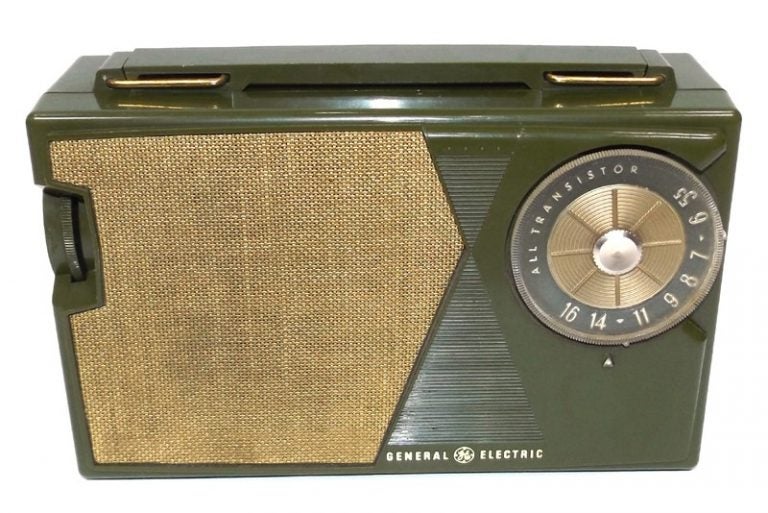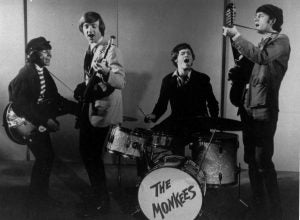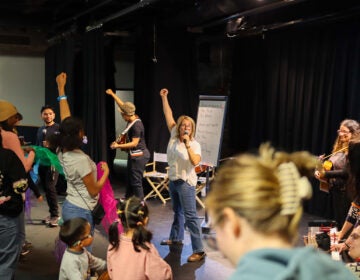The green radio
Songs from a half century ago still resound with meaning for a troubled time

(Chris Gibbons/for WHYY)
“The world is a bad place, a bad place,
A terrible place to live, oh, but I don’t wanna die.
All my sorrows, sad tomorrows, take me back, to my old home.”
— “Reflections of My Life” by the Marmalade
It was just a little green radio with a big, clear, plastic tuning dial. In the late 1960s, my big brother Mike found a small piece of wood paneling and used it as a shelf for the green radio, and he placed it on the wall above his bunk-bed.
There were four of us in that bedroom, and every night we would fall asleep with the radio on. We would listen to Philadelphia radio stations WFIL and WIBG (or “WIBBAGE” as we used to call it), and the songs that the DJ’s played became the soundtrack of our childhood.
Sometimes we would sing along to the songs, and my brothers would laugh when I imitated Frankie Valli’s falsetto voice in a mock rendition of “Big Girls Don’t Cry.” My parents would hear the laughter and tell us to get to bed, and turn the radio off.
Unfortunately, we also heard the news broadcasts drift up to our room as my parents watched television downstairs. Unlike the green radio, those television broadcasts were much more serious and ominous. We tried not to listen, and instead focused on the music emanating from the green radio. In a world apparently gone mad, the green radio helped to restore some sense of sanity and safety.
Fifty years ago, in the summer of 1968, the world did seem like it was a very bad place. The war in Vietnam was still raging; Martin Luther King and Bobby Kennedy were recently assassinated; protesters and police battled in the streets of Chicago during the Democratic National Convention; and riots erupted across the urban areas of some large cities. America’s cities were burning.
Although I was just a child at the time, I do remember some of the disturbing images from the television, and the concerned, sometimes incredulous, looks on my parents’ faces as they watched the evening news.
“What in the world is happening,” I can remember my mother questioning on numerous occasions. My older brothers were a few years younger than the dead soldiers and the beaten, bloodied protesters who filled the television screen that summer. But one of the older boys on our street would soon be off to Vietnam, and my parents were justifiably worried.
Our country seemed to be falling apart, and the spirit of rebellion that it spawned eventually seeped into our home as my brothers battled with my Dad over the length of their hair, going to church on Sundays, and the “hippie” music they liked to listen to. Sometimes, if the arguing got too loud, I would escape to the bedroom and turn on the green radio to drown out the noise.
Of course, to my Dad, anything coming from WFIL or WIBG back then was “hippie” music, but to all of us, the music seemed to serve as a way in which our generation bonded and distinguished itself from the older generation. This was “our” music, and the variety and quality of it in the late ’60s was stunning.
On one radio station, you could hear the psychedelic sounds of the Jefferson Airplane, the hard rock of Steppenwolf, the pop music of the Monkees, the soul music of the Temptations, or the beautiful ballads of the Carpenters.

The music of the Beatles, the Turtles, Smokey Robinson, the Rascals, the Supremes, and the Beach Boys filled our bedroom that summer, and we sang along as we forgot about the violence and turbulence that was rocking the country.
The DJs on WFIL (Boss Jocks) and WIBG (Good Guys) became local celebrities, and we quickly came to recognize the voices and distinct personalities of Hy Lit, Jim Nettleton, “Long John” Wade, Dr. Don Rose, Bob Charger, and Duke Roberts. I always looked out for the WFIL “Prize Patrol” whenever I was in the car, but I never did see the bright red Mustang following us. Even if I had, my Dad would have never stopped the car to collect the prize. I could just hear him now, “Just a bunch of hippie-crap for a prize, anyway!”
The green radio, along with the old WFIL and WIBG radio stations, are long gone. Fortunately, the music still lives.
Before my parents sold their home in Cape May Courthouse several years ago, my brother Mike and I would sometimes get together there and sit in the yard at night with the satellite radio tuned in to the ’60s and ’70s stations. We’d look up at the stars and reminisce about those summer days of 1968 when, though the world seemed to be falling apart, the music emanating from the green radio in our bedroom helped to shelter us from the chaos enveloping the world. A familiar song from that era would often come on the radio, and Mike and I would look at each other and say, “That’s a ‘green radio’ song!”
It’s been 50 years since that tumultuous summer of 1968, and, unfortunately, the world still often seems like a terrible place to live. Our country is once again starkly divided, American soldiers still die in war zones, terrorists continue to threaten us, and the possibility of global nuclear annihilation has not abated.
Rather than tacitly accept this endless cycle of violence, those of us who lived through it have an obligation to break it by teaching our children what we have learned.
The songs of the green radio once preserved the innocence of our youth, but the words of some of those songs now also serve as a reminder of our responsibility to the next generation:
“Wake up, all the teachers
Time to teach a new way
Maybe then they’ll listen
To what’cha have to say
‘Cause they’re the ones who’s coming up
And the world is in their hands
When you teach the children
Teach ’em the very best you can”
— “Wake Up Everybody” by Harold Melvin & the Bluenotes
Chris Gibbons is a Philadelphia writer. He can be reached at gibbonscg@aol.com.
WHYY is your source for fact-based, in-depth journalism and information. As a nonprofit organization, we rely on financial support from readers like you. Please give today.




